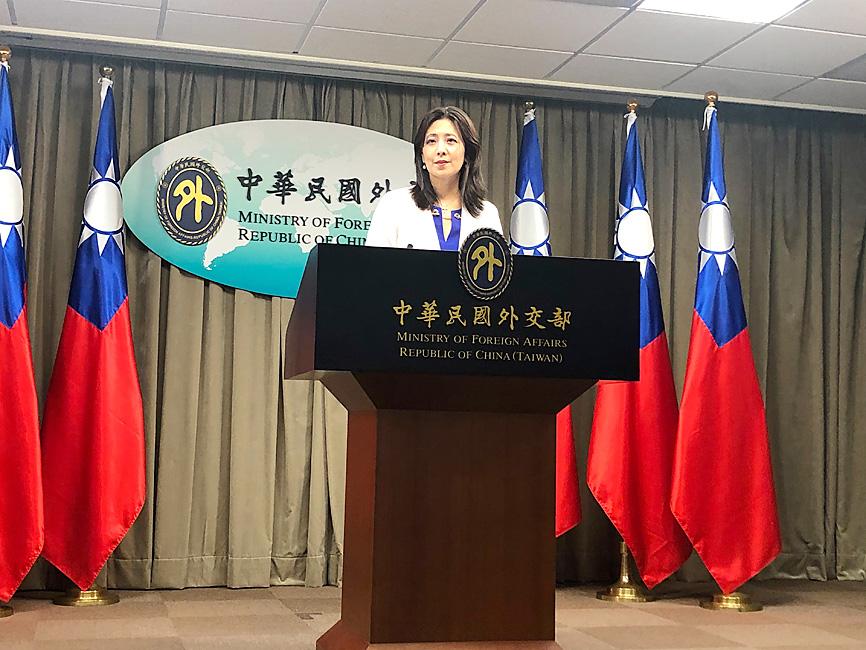The Republic of China (Taiwan) is a sovereign nation, not part of the People’s Republic of China (PRC), the Ministry of Foreign Affairs said yesterday, after Washington said it does not support Taiwanese independence.
“We support a strong unofficial relationship with Taiwan. We do not support Taiwan’s independence. We fully recognize, understand the sensitivities involved here,” US National Security Council Indo-Pacific Coordinator Kurt Campbell said on Tuesday during a videoconference with the Asia Society Policy Institute (ASPI).
Campbell made the remarks when asked by ASPI International Security and Diplomacy vice president Daniel Russel how much love and support Washington can show to Taiwan under its “one China” policy and the US’ Taiwan Relations Act.

Photo: Lu Yi-hsuan, Taipei Times
Taiwan has the right to live in peace and should have a role to play in the international community, particularly in areas related to vaccines and the COVID-19 pandemic, Campbell said.
He said that there is a “dangerous” balance to maintain across the Taiwan Strait and warned China about “catastrophic” results if it dares to do to Taiwan what it has done to Hong Kong.
In Taipei, the Ministry of Foreign Affairs thanked Washington for supporting Taiwan’s participation in international affairs and having donated it 2.5 million COVID-19 vaccines.
Since taking office, US President Joe Biden’s administration has repeatedly stressed that Washington’s support for Taiwan is “rock solid,” while it has also engaged other allies to underscore the importance of peace and stability across the Taiwan Strait, ministry spokeswoman Joanne Ou (歐江安) said in a statement.
As a responsible and reliable partner, Taiwan sustains close cooperation with the US on many regional and global issues, and the nation is glad to continue making contributions to the international society, Ou said.
Ou also asserted the nation’s sovereignty.
“ROC Taiwan is a sovereign nation, not part of the PRC; that is a fact as well as the ‘status quo,’” she said.
The government has been cautiously handling cross-strait relations based on a steady and practical attitude, while defending its liberal democracy and striving for more opportunities to participate in international affairs, Ou said.
The ministry would continue to work closely with the US and deepen bilateral partnerships based on firm foundations, she said.
In other news, the ministry on Tuesday night welcomed the appointment of Sandra Oudkirk — US senior official for APEC and deputy assistant secretary for Australia, New Zealand and the Pacific Islands — as the next director of the American Institute in Taiwan (AIT), making her the first female director of the US’ de facto embassy.
“The @StateDept official brings a wealth of experience to the role, it’s expected the #Taiwan-#US relationship will continue flourishing under her watch,” the ministry wrote on Twitter yesterday.

NATIONAL SECURITY THREAT: An official said that Guan Guan’s comments had gone beyond the threshold of free speech, as she advocated for the destruction of the ROC China-born media influencer Guan Guan’s (關關) residency permit has been revoked for repeatedly posting pro-China content that threatens national security, the National Immigration Agency said yesterday. Guan Guan has said many controversial things in her videos posted to Douyin (抖音), including “the red flag will soon be painted all over Taiwan” and “Taiwan is an inseparable part of China,” while expressing hope for expedited “reunification.” The agency received multiple reports alleging that Guan Guan had advocated for armed reunification last year. After investigating, the agency last month issued a notice requiring her to appear and account for her actions. Guan Guan appeared as required,

A strong cold air mass is expected to arrive tonight, bringing a change in weather and a drop in temperature, the Central Weather Administration (CWA) said. The coldest time would be early on Thursday morning, with temperatures in some areas dipping as low as 8°C, it said. Daytime highs yesterday were 22°C to 24°C in northern and eastern Taiwan, and about 25°C to 28°C in the central and southern regions, it said. However, nighttime lows would dip to about 15°C to 16°C in central and northern Taiwan as well as the northeast, and 17°C to 19°C elsewhere, it said. Tropical Storm Nokaen, currently

PAPERS, PLEASE: The gang exploited the high value of the passports, selling them at inflated prices to Chinese buyers, who would treat them as ‘invisibility cloaks’ The Yilan District Court has handed four members of a syndicate prison terms ranging from one year and two months to two years and two months for their involvement in a scheme to purchase Taiwanese passports and resell them abroad at a massive markup. A Chinese human smuggling syndicate purchased Taiwanese passports through local criminal networks, exploiting the passports’ visa-free travel privileges to turn a profit of more than 20 times the original price, the court said. Such criminal organizations enable people to impersonate Taiwanese when entering and exiting Taiwan and other countries, undermining social order and the credibility of the nation’s

‘NATO-PLUS’: ‘Our strategic partners in the Indo-Pacific are facing increasing aggression by the Chinese Communist Party,’ US Representative Rob Wittman said The US House of Representatives on Monday released its version of the Consolidated Appropriations Act, which includes US$1.15 billion to support security cooperation with Taiwan. The omnibus act, covering US$1.2 trillion of spending, allocates US$1 billion for the Taiwan Security Cooperation Initiative, as well as US$150 million for the replacement of defense articles and reimbursement of defense services provided to Taiwan. The fund allocations were based on the US National Defense Authorization Act for fiscal 2026 that was passed by the US Congress last month and authorized up to US$1 billion to the US Defense Security Cooperation Agency in support of the